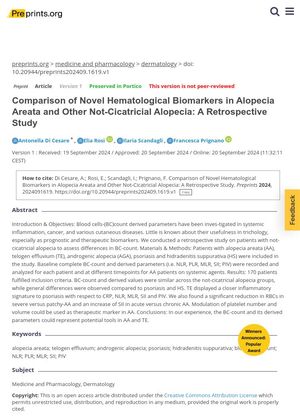Comparison of Novel Hematological Biomarkers in Alopecia Areata and Other Non-Cicatricial Alopecia: A Retrospective Study
September 2024

TLDR Blood cell counts could help predict and treat alopecia areata and telogen effluvium.
The study retrospectively analyzed blood cell count (BC-count) and derived parameters in 170 patients with various types of not-cicatricial alopecia, including alopecia areata (AA), telogen effluvium (TE), and androgenic alopecia (AGA), as well as psoriasis and hidradenitis suppurativa (HS). Results showed that BC-count and derived values were similar across the alopecia groups but differed from those with psoriasis and HS. TE had an inflammatory profile closer to psoriasis. Significant findings included reduced RBCs in severe AA compared to patchy AA and increased systemic immune-inflammation index (SII) in acute versus chronic AA. The study suggests that BC-count and derived parameters could be useful prognostic and therapeutic biomarkers in AA and TE.

